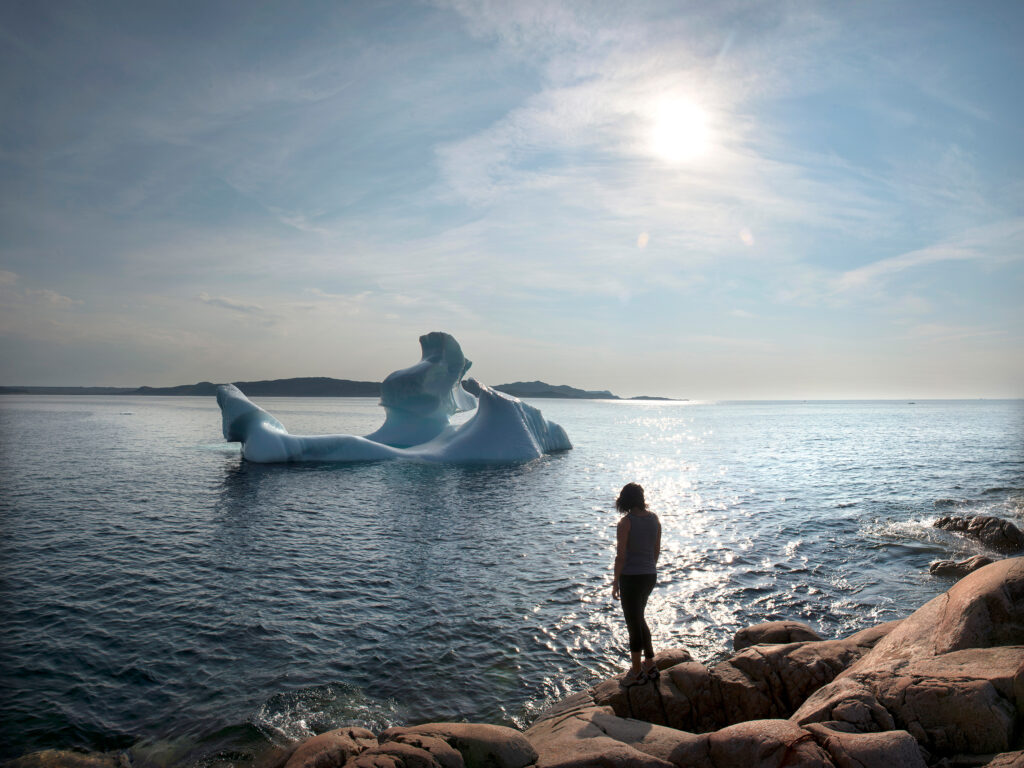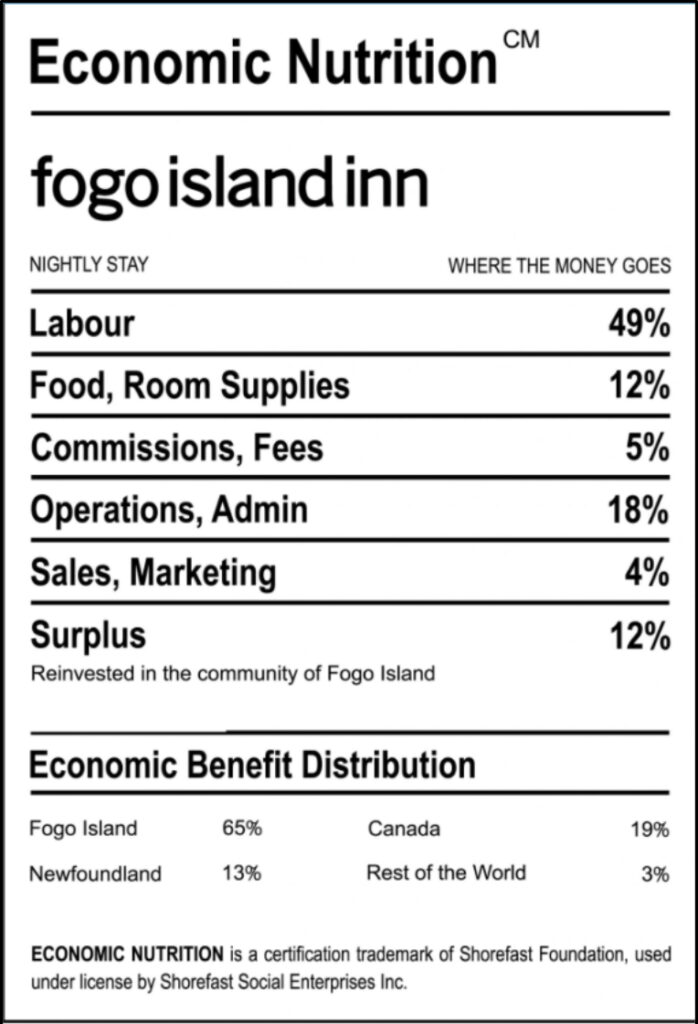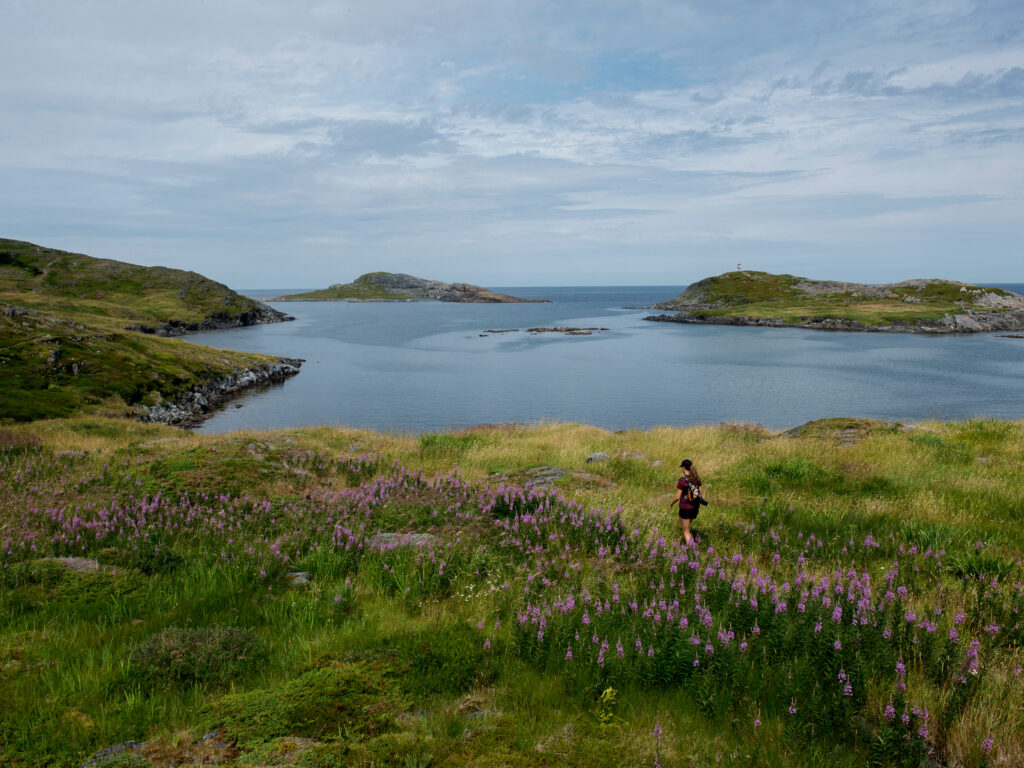
FORESTIS – A Luxury Eco-Conscious Retreat
FORESTIS is a luxury, eco-conscious retreat nestled in the beautiful Dolomite Mountains of Italy.
Newfoundland, Canada
Abbigale Shi May 24, 2021
In an effort to strengthen both cultural and economic resilience throughout her native island, Zita Cobb founded Fogo Island Inn on Newfoundland, Canada in 2013. Guided by the principles of sustainable tourism and economic revitalization, the Inn and its parent organization, the non-profit Shorefast, strive to center local businesses through their various partnerships and job opportunities. These in turn preserve the landscape and traditions of Newfoundland, while simultaneously respecting nature and culture. Beyond this, the Inn is also a pioneer of sustainable technology, reducing its environmental impact through conservation strategies such as solar panels and cod potting.
Nestled in the rocky shores of this rugged Canadian island, the Fogo Island Inn bridges the gap between its guests and the untouched wilderness surrounding it. Home to a diverse array of animals, plant life, and geological structures, Fogo’s “still-wild world” becomes an integral element of the guest experience through the Inn’s comprehensive list of cultural and outdoor activities. In these ways, the Fogo Island Inn invites us not only to reflect upon but experience the intersections of human and natural history.
Mood of Living : Where did you grow up?
ZC: I grew up in the very small community of Joe Batt’s Arm on Fogo Island. The island is situated off the coast of another, bigger island called Newfoundland and Labrador, the easternmost province of Canada.
MoL: Where are you currently located?
ZC: I would typically spend most of my time either on Fogo Island or traveling for speaking engagements and my work for our charity Shorefast, but I have been grounded in Ottawa (Canada) since March 2020, when COVID restrictions were implemented.
Zita Cobb, Fogo Island Inn
MoL: Where did you go to school? What did you study?
ZC: I finished high school on Fogo Island and left to study business at Carleton University in Ottawa.
MoL: Where is Fogo Island? Who were the first settlers on the island and how did these settlers make a living? How and why did the fishing industry on the island nearly collapse? How is it doing today?
ZC: Fogo Island is an island off the island province of Newfoundland and Labrador; it sits on the North Atlantic coast of Canada, in the Labrador current, far away from far away. The population is about 2,400. The descendants of early Irish and English settlers who live here today are resilient and resourceful people – we’ve clung onto this place for more than 400 years, through the changing fortunes of the fisheries on which our communities were built.
For four centuries we sustained ourselves by fishing for cod in small wooden boats, rarely venturing more than 5 miles from the shore. This small scale, inshore fishery was dramatically impacted by the industrialization of the fishery starting in the 1960s. While fishing remains crucial to Fogo Island, geotourism, and the microbusinesses that grow from it create complementary revenue streams and foster economic resilience.
We draw on skills passed on through generations, like boatbuilding, root cellaring and quilting, embracing the island’s seven seasons. While tourism is a relatively new phenomenon on Fogo Island, we have hospitality in our DNA, and visitors are welcomed here with genuine warmth as if they were distant cousins we have not yet met.
MoL: What was life-like living on Fogo Island as a child? How has the island and the community changed since your childhood?
ZC: I often say I grew up feral. When not at school, I spent my days at the shore or running across bogs and barrens. The ocean and the raw wilderness are omnipresent on Fogo Island and that remains a constant today. Our home was a base camp of care and nurturing that supported a very independent young life. There have been profound changes on the island since my childhood – the arrival of electricity and running water to name a few. But the essence of the island, the sense that nature always has the upper hand and that our lives are enriched by adapting to its gestures has remained the same.
MoL: What was your professional path that led you to work in the hi-tech fibre optics industry? What motivated you to leave this industry?
ZC: After studying business at University, I began my career in the oil and gas industry in western Canada. I quickly learned that I didn’t fit well in large companies, so I moved to work with a small engineering firm specializing in cold regions technology. That was the beginning of a career as a financial professional working with small technology companies that seemed to have a habit of becoming larger technology companies. When I joined JDS Optics in 1989, we were a rag tag team of 89 physicists and engineers working at the forefront of optical technologies for telecommunications. When I left the company (then JDS Uniphase), we had grown into a global company with 40,000 employees spread around the world. I left the company in 2001 at the age of 42 with two goals; firstly, to sail around the world and secondly, to dedicate my time, financial resources and energies to making proximate communities possible in an increasingly globalized world. I sailed for five years although I haven’t yet completed a circumnavigation. And I have discovered that the work of making proximate communities possible requires many lifetimes.
MoL: What is the Shorefast Foundation and why did you create it? What is the main purpose of the Foundation? What are the Foundation’s various initiatives that positively impact the island?
ZC: Shorefast is a registered charity of Canada which we founded in 2004. The mission of Shorefast is to build cultural and economic resilience on Fogo Island and to serve community well-being by sharing new models of economic development that hold learnings for places around the globe. Shorefast is comprised of a set of charitable programs and social businesses all in service of the local community. Together, they represent a holistic set of initiatives aimed at supporting a way of life that is equitable, dignified, sustainable, and joyful.
Revitalizing our economy through social businesses such as Fogo Island Inn, the Woodshop of Fogo Island and Fogo Island Fish, which draw on the assets of this place, creates opportunities for younger—and future generations—to stay on the island, raise their own children and make a living here. They know firsthand how special it is to have a stable relationship with a place, to grow up with relative freedom, enjoying the natural beauty of the island and deep connections with family and all the generations that came before.
MoL: How did growing up in the community shape your view of sustainability and social enterprise?
ZC: The economist EF Schumacher wrote that “Nature and culture are the two great garments of human life. Business and technology are the two great tools that can and should serve them”. Everything about my upbringing taught me that this is true. Nature and culture have inherent value and are essential to our human ability to make meaning. Sustainability is about finding ways to work in positive ways with nature and culture, finding ways of doing business that can be sustained into perpetuity. Not all investment is development. I am interested in the proper development of the inherent assets of place, sometimes called asset-based community development. Proper development calls us to ask and answer: What do we have? What do we know? What do we love? What do we miss? And most importantly, what can we do about it?
Knowledge and skills like boat building, quilting, matting, and furniture making are at the heart of our culture, a culture was shaped by this singular place. This know-how has been passed on from generation to generation, and are a part of how we know who we are, how we make meaning. With the advent of mass-produced products, they risked being lost forever. It is joyful work to figure out how to create new business models based on these skills and this knowledge – to give our communities an economic foundation on which to flourish in a continued relationship with this place. I’d like to think that 100 years from now, young Fogo Islanders will be chasing along the same shorelines, the same barrens that I did growing up in the 1960s. I want them to have the same gift of place that I had.

MoL: What local craft is unique to Fogo Island? Is boat building still important?
ZC: Wooden boats have fallen out of use in the modern fishery. But we still build them for recreational use, and to hold onto the know-how.
Boat-building skills are the basis of the wood furniture we offer at the Woodshop on Fogo Island. Take the Punt Chair for example. Fogo Islanders know that nature knows best and that our trees know to grow the strongest, sturdiest curves as they emerge from under the ground and reach up into the unforgiving Newfoundland wilderness. Fogo Island and Change Island boat-builders use these natural curves of juniper and spruce trees to create the structural ribs of their punts: the small wooden fishing boats that served as the traditional workhorses of the inshore fishery. It takes a trained local eye to find the right trees, and a particular season to harvest.
Using the same method, we created the Punt Chair. The yearly harvesting of timbers means that each Punt Chair is identified according to when the timbers were harvested, from where, and by whom. Each chair simultaneously carries forward the history of the tree used to make it, a centuries-old knowledge of outport woodworking and ingenuity, and our singular boatbuilding heritage. In addition to woodworking, there are a host of textile skills that are integral to our culture. For example, Fogo Islanders have their own ways with quilting, knitting and matting and these handmade products are featured at Fogo Island Inn.
MoL: Is the Fogo Island Inn a part of the Shorefast Foundation initiative? Who owns the inn?
ZC: Fogo Island Inn is owned by Shorefast, a registered charity of Canada. It is operated as a social business by Shorefast Social Enterprises. The Inn has a radical business model: Through the charity, Shorefast, the people of Fogo Island are the 100 percent beneficial owners of the Inn. All surpluses from the Inn are reinvested in our community. Some hospitality businesses have a charitable foundation, our charitable foundation has an Inn!
MoL: What considerations did Newfoundland born and raised architect, Todd Saunders, have regarding the local community and the natural environment when designing the Inn? How does his architectural design reduce its environmental impact?
ZC: When I approached Todd Saunders to design the Inn, I had a very simple brief: “Design a contemporary Inn, with a 100+year horizon that can hold what we have learned in 400 years of living in this place”.” From its inception, Fogo Island Inn adopted a responsible approach to design and implementation to uphold a higher fidelity relationship with the natural world. From the beginning of our work, we have practiced sustainability holistically and have understood the interconnectedness among the three pillars of sustainability: social, ecological and economic. This approach applies to the design and construction of the Inn as well as all our operations, our procurement policies, our energy consumption all while still ensuring a nuanced and dignified world-class luxury experience for our guests .
MoL: How does Fogo Island Inn support, reinvest in, and uplift its local culture and economy? How did you involve local talent in the ideation and creation of the hotel? How does the hotel nurture local skills and talent?
ZC: When we built Fogo Island Inn, nearly all of the furniture and furnishings inside were designed and created on Fogo Island. The furniture is the result of a collaborative process between international artists and designers, and skilled artisans from Fogo Island and Change Islands. Contemporary designers worked side-by-side with local craftspeople to create furniture and furnishings, like quilts and rugs, that embodied a “new outport aesthetic”—weaving the new from the fabric of the old. This initial collaboration gave rise to a new social business; The Woodshop on Fogo Island, which employs local artisans and makers. Many of our guests at the Inn have become customers of the Woodshop and have been able to bring back home furniture and textile pieces that embody their relationship with Fogo Island.
In building the Inn we sourced all materials from as close to home as possible and we have carried this practice through into the operation of the Inn. This practice is good for the local economy and shortening transportation distances is good for the environment. We pioneered the practice of Economic Nutrition labelling, a practice of radical transparency, which demonstrates where the money goes. Here is an example of the Economic Nutrition Mark for a stay at the Inn:

MoL: Does your restaurant support and collaborate with local farmers? If so, how?
ZC: The opening of the Inn in 2013 was like an electric eel in the local pond of growers and foragers. Old gardens that had fallen out of use were restored to use. Shorefast initiated the formation of an agricultural Co-op on the island, reigniting interest and knowledge sharing about growing in this sub-arctic terrain. At Fogo Island Inn, food is the medium through which nature and culture come together to form an absolute expression of locality. We honour Fogo Island’s foodways through simple, contemporary cuisine. We use ingredients dictated by Fogo Island’s still-wild world to create dishes that are grounded in place, all year long, across our seven seasons. Ingredients we use are fished, farmed, and foraged right here. Our philosophy is to hold an 80-20 rule, allowing for 20% of products that come from away like coffee, wine, olive oil, etc.
MoL: What is Fogo Island Arts and how is it connected with the Fogo Island Inn and the Shorefast Foundation? What is the artist-in-residence programme and what kind of projects do this residence support? How does this programme support the island?
ZC: Fogo Island Arts is a residency-based contemporary art venue that was initiated by Shorefast and founded in 2008. Fogo Island Arts provides support for artistic exploration and production for artists, filmmakers, writers, musicians, curators, designers, and thinkers who hail from all corners of the planet. Art is a way of knowing, of sense making. Artists can help us see differently, more clearly. Through Fogo Island Arts, we are exploring how contemporary art might point to alternative solutions for the many crisis’s we humans have created for ourselves. The presence of leading international artists over the years has not only broadened and deepened our relationship with the world in new ways, but has also helped shape our own identity through the prism of how these artists see and come to belong to the island. Art shapes how we belong to the world.
MoL: How are you continuing to adapt your philanthropic approach to fit the growing needs of the island? How do you balance building the local economy with the risk of over-tourism?
ZC: When we created the Fogo Island Inn, we decided it would only have 29 rooms, because, as one local woman said “we are only 2400 people and we can only love so many people at a time”. There are two important requirements for sustainable tourism: the scale has to be appropriate to the size of the community and tourism shouldn’t be the only industry. We are very lucky that we still have a vibrant fishery and we have been very careful, starting with the Inn, to maintain an appropriate scale for the tourism undertakings on the island. Our approach to appropriate scale combined with the remoteness of the island, work together to keep over-tourism at bay.
While the Fogo Island Inn remains the main economic engine of Shorefast, we are always exploring new ways to grow and further develop our group of social enterprises and create new opportunities for Fogo Islanders. With COVID, we have recalibrated the Woodshop of Fogo Island to be a more robust e-commerce business and are looking at new opportunities to export products from Fogo Island.
MoL: What do you hope guests take away from their stay at Fogo Island Inn?
ZC: That we exist in relationship to the whole: the whole planet, the whole of humanity, the whole of existence. Fogo Island Inn is a model for how we can find ways to belong to the whole while upholding the specificity of people and place. The global economy has hollowed out communities around the world, often left with a bleak outlook for the future. By localizing the global economy like we are modelling on Fogo Island, and by sharing our experience with others, together we can create a global network of healthy and empowered, place-specific communities.
We hope that people take this perspective back to their own communities. And of course, we hope that when they leave, this powerful place will have distilled them so they have a clearer understanding of their own essence; that they feel ‘given back to themselves’; that their visit brought them joy, not just pleasure.
MoL: What do you envision for Fogo Island Inn’s future?
ZC: I envision a vibrant community built on a resilient, regenerative local economy; a population that can grow to the 5000 people we once were on the island; a place of cultural, artistic, and economic innovation where people continue to live in an unmediated relationship with the natural world. I envision a continuation of our commitment to art, hospitality, and social business.

MoL: What have you learned by creating a successful social enterprise? What advice can you give to others interested in creating a social enterprise of their own? How can business prosper by supporting people and culture?
ZC: We have learned that beautiful businesses – ones that strengthen nature and culture – can be financially sustainable and infinitely joyful. Our ambition is to share what we have learned with other communities and other entrepreneurs, with people who want to shape a world where we can all flourish and live a dignified life. For people who want to start a social business, my main advice is ‘don’t’ dabble’. Starting a business is rarely easy but if you commit yourself to it, the world will move with you. And if not you, then who should start that business? It’s up to each of us to shape the world we want to live in.
We recently launched a new pilot project as the lead-up to the creation of a Community Economics Network. Through the pilot project, we have partnered with other communities in Canada, as well as a group of global leaders and thinkers across the business and government sectors, with the goal to build together an architecture for collaboration that is vital for long-term, sustainable community economic development.
It’s still early days for this initiative but we are encouraged to see signals in the world that more and more of us want to bring about these changes for the future of people and planet. What we do individually and collectively, matters. It matters a lot.
Photography courtesy of Fogo Island Inn and photographer Alex Fradkin

FORESTIS is a luxury, eco-conscious retreat nestled in the beautiful Dolomite Mountains of Italy.

An historic English estate, turned into an eco-friendly, elegant hotel, set in over 400 acres in the Hampshire countryside.

The four sustainable luxury resorts — Soneva Fushi, Soneva Jani, Soneva in Aqua, and Soneva Kiri — allow guests to reconnect with nature. Soneva is perfect for those who are looking for a slower, immersive island experience.